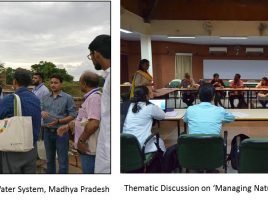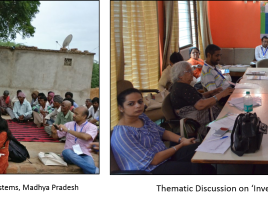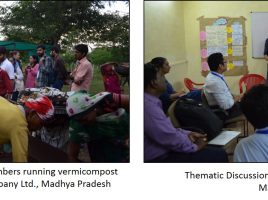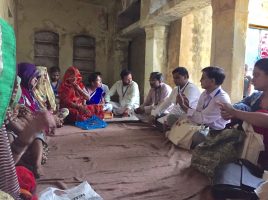Inter-linkages between MSMEs and High Impact Sectors
TARAgram Yatra 2017, eighth in the annual event series of Development Alternatives, focused on developing ‘Economies for People and Planet’. While attempting to understand the economies that are sustainable, the yatra tried to explore various driving forces that are responsible for developing an ecosystem to support a sustainable economy. The potential of MSMEs in ‘Greening the High Impact Sectors’ was one of the topics for discussion at this yatra.
Prior to identifying the potential of MSMEs in greening these High Impact Sectors (HIS), an understanding about the identification of HIS was considered fundamental for exploring the need for greening the sectors. The discussions at the Yatra emphasised on the need for focusing beyond conventional HIS (including agriculture, construction, energy, tourism etc). While these sectors are contributing to country’s GDP significantly, they do not make the list of HIS exhaustive. Diverting attention towards other sectors like e-retailing and waste management was thought to be pragmatically more important.
On one hand, exploring the unconventional sectors as HIS was considered to be important, and on the other hand MSMEs were witnessed to be the drivers of innovation. Continuous innovation was recognised to be the key element for greening a sector. Incentivising MSMEs to drive innovation and developing synergies between MSMEs across different products/services could help in achieving the twin objective of greening the economy while ensuring job creation. Interestingly, the contribution by MSMEs was felt not to be limited to their own level only, rather could contribute more widely in the ecosystem. MSMEs could serve as experimental labs for the big businesses. This would help in improving the value chain by ensuring resource efficiency, and would further contribute towards creating a green economy for the people to reside. They could be the ‘ambassadors’ to take the information and enhance its circulation, thereby contributing to positive externality.
While there is a potential role of MSMEs in greening the HIS, certain practical obstacles need to be overcome in order to benefit from the rising roles of MSMEs. There is a series of responsibilities on MSMEs at the time of entering the market in order to be part of the green business group. MSMEs have to conduct green business; they need to generate employment; and they have to compete with the big businesses in order to sustain themselves, while contributing in greening the economy. All these responsibilities implicitly assume that MSMEs will have sufficient funds/capital to start and ensure their survival in the market, and the nature of business activity will be profitable. However, in the real scenario, the path is patchy and MSMEs encounter a lot of struggle in raising their capital and competing with the big businesses, for multiple reasons – one of the prominent ones being lack of access to benefits of scale.
The government, in this case, can play an important role in incentivising the start-ups and MSMEs to kick start the innovation. This could be the only alternative to overcome the challenges faced by MSMEs in continuing their operations in greening the HIS. Additionally, as MSMEs could also be the carriers of information, they should be viewed across products as resources to each other; therefore, establishing networks of MSMEs will help reduce their dependence on fresh resources, and would contribute in conducting green business practices, thereby greening the sector.
Shruti Issar
sissar@devalt.org
The views expressed in the article are those of the author’s and not necessarily those of Development Alternatives.







Leave a Reply